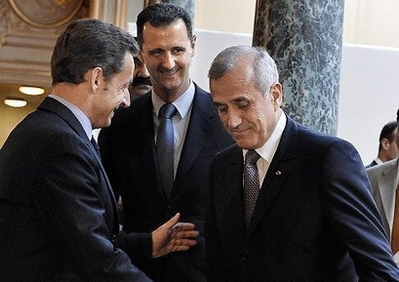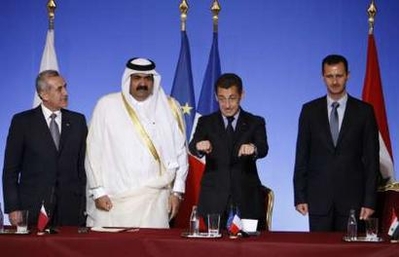 PARIS (AFP) - Lebanon and Syria have agreed to establish diplomatic relations, opening embassies in each others' capitals for the first time since their independence from colonial rule. French President Nicolas Sarkozy announced the landmark decision Saturday following talks with Syrian President Bashar al-Assad and Lebanese President Michel Sleiman, whose election in May ended a drawn-out political crisis in Lebanon. "For France, this is historic progress," Sarkozy told a press conference. "Of course there are a number of legal questions that have to be settled... but for us... this announcement is absolutely historic. It is great news for all those who love Lebanon and are concerned by developments there," he said. Presidents Assad and Sleiman confirmed the news at a joint press conference later on Saturday. "Our position is that there is no problem for the opening of embassies between Syria and Lebanon," said Assad. "If Lebanon is willing to exchange embassies, we have no objections to doing it," he added. For Lebanon, Sleiman confirmed that the two governments were going to "work together to put everything in motion as soon as possible."
PARIS (AFP) - Lebanon and Syria have agreed to establish diplomatic relations, opening embassies in each others' capitals for the first time since their independence from colonial rule. French President Nicolas Sarkozy announced the landmark decision Saturday following talks with Syrian President Bashar al-Assad and Lebanese President Michel Sleiman, whose election in May ended a drawn-out political crisis in Lebanon. "For France, this is historic progress," Sarkozy told a press conference. "Of course there are a number of legal questions that have to be settled... but for us... this announcement is absolutely historic. It is great news for all those who love Lebanon and are concerned by developments there," he said. Presidents Assad and Sleiman confirmed the news at a joint press conference later on Saturday. "Our position is that there is no problem for the opening of embassies between Syria and Lebanon," said Assad. "If Lebanon is willing to exchange embassies, we have no objections to doing it," he added. For Lebanon, Sleiman confirmed that the two governments were going to "work together to put everything in motion as soon as possible."
 According to Suleiman, the legal and administrative arrangements needed to implement "this agreement would be taken as soon as possible in coordination between the two capitals," Beirut and Damascus. "We look forward to tackling the topic of demarcating the Lebanese-Syrian borders through the required mechanism based on the brotherly relations between the two sisterly states," Suleiman said. He said Lebanon is "committed to regaining its full sovereignty over the Shebaa Farms," an area occupied by Israel since 1967. Answering reporters' questions as to whether Lebanon would go into peace talks with Israel, Suleiman said: "We expect Israel to implement international resolutions, especially UN Security Council Resolution 1701 that was adopted two years ago and Israel has not pulled out of the Ghajar (village) Shebaa Farms and Kfar Shouba hills." On May 24, 2000, Israel withdrew its troops from a large territory in southern Lebanon, which it had been occupying since 1978. A significant issue relating to the withdrawal remains unsettled. This relates to the status of certain villages and adjacent land on the eastern side of Alsheikh Mountain, known as the Shebaa Farms. The Lebanese government advised the United Nations that it considers the area to be Lebanese territory and that, as such, the withdrawal must encompass it. Israel insists that the land was captured from Syria in 1967 and its fate should be discussed in future peace talks between Israel and Damascus. Meanwhile Druze leader Walid Jumblatt, a key member of Lebanon's ruling majority, lashed out at France for receiving the Syrian president. "Receiving the head of the Syrian regime by the French leadership is a clear disrespect to the feelings of the Lebanese people and its prisoners who are still held in Syria," Jumblatt told a group of his followers on Sunday. No-one knows exactly how many Lebanese political prisoners are in Syrian jails. Syria and Lebanon's former pro-Syrian president Emile Lahoud have denied there are any. They claim all political prisoners were released in December 2000. But Ghazi Aad, head of a group called SOLIDE (Support of Lebanese in Detention and Exile) said he has been working with the families of detainees for 15 years. He added that his organization has files on 176 known detainees in Syrian prisons and there could be more.
According to Suleiman, the legal and administrative arrangements needed to implement "this agreement would be taken as soon as possible in coordination between the two capitals," Beirut and Damascus. "We look forward to tackling the topic of demarcating the Lebanese-Syrian borders through the required mechanism based on the brotherly relations between the two sisterly states," Suleiman said. He said Lebanon is "committed to regaining its full sovereignty over the Shebaa Farms," an area occupied by Israel since 1967. Answering reporters' questions as to whether Lebanon would go into peace talks with Israel, Suleiman said: "We expect Israel to implement international resolutions, especially UN Security Council Resolution 1701 that was adopted two years ago and Israel has not pulled out of the Ghajar (village) Shebaa Farms and Kfar Shouba hills." On May 24, 2000, Israel withdrew its troops from a large territory in southern Lebanon, which it had been occupying since 1978. A significant issue relating to the withdrawal remains unsettled. This relates to the status of certain villages and adjacent land on the eastern side of Alsheikh Mountain, known as the Shebaa Farms. The Lebanese government advised the United Nations that it considers the area to be Lebanese territory and that, as such, the withdrawal must encompass it. Israel insists that the land was captured from Syria in 1967 and its fate should be discussed in future peace talks between Israel and Damascus. Meanwhile Druze leader Walid Jumblatt, a key member of Lebanon's ruling majority, lashed out at France for receiving the Syrian president. "Receiving the head of the Syrian regime by the French leadership is a clear disrespect to the feelings of the Lebanese people and its prisoners who are still held in Syria," Jumblatt told a group of his followers on Sunday. No-one knows exactly how many Lebanese political prisoners are in Syrian jails. Syria and Lebanon's former pro-Syrian president Emile Lahoud have denied there are any. They claim all political prisoners were released in December 2000. But Ghazi Aad, head of a group called SOLIDE (Support of Lebanese in Detention and Exile) said he has been working with the families of detainees for 15 years. He added that his organization has files on 176 known detainees in Syrian prisons and there could be more. Britain, Germany and the United States late Saturday welcomed the decision of creating embassies btw Syria and Lebanon, but Washington urged Damascus to end its "destabilizing tactics" in the region.
"We continue to support the establishment of good relations between Lebanon and Syria on the basis of mutual respect (and) we join with France in reiterating the commitment to a sovereign and independent Lebanon," Rob McInturff, a State Department spokesman, told AFP.
But he added that Washington would "continue to limit our diplomatic engagement unless Syria takes concrete actions to end its destabilizing tactics in the region."
McInturff said the United States and other Lebanon watchers "were waiting for a signal that the Syrians are ready to renounce their sponsorship of terrorism, to do more to end the flow of foreign fighters into Iraq, to expel the leadership of Palestinian terrorist groups, and to end human rights violations."
Washington continues to blacklist Syria as a state sponsor of terrorism.
In London a Foreign Office spokeswoman told AFP: "If it means that Syria is going to play a more constructive role in the region, that can only be a good thing."
German European Affairs Minister Guenter Gloser welcomed the decision as "considerable progress", the foreign ministry in Berlin quoted him as saying.
"It shows Syria's change of perspective and contributes to stability in the region," he added.
Relations between Syria and Lebanon have been tense since the forced withdrawal of Syria's troops from the country in April 2005 after the assassination of billionaire former premier Rafiq Hariri.
Syria was widely blamed for the killing but denies involvement.
Assad last month said Damascus was ready to open an embassy in Lebanon once a unity government was formed and had developed good relations with Syria.
Lebanon announced a 30-member national unity government on Friday tasked with resolving the country's worst political crisis since a 1975-1990 civil war.
The Syrian and Lebanese leaders met at the French presidential palace in the presence of Qatari Emir Sheikh Hamad bin Khalifa al-Thani, whose country brokered the power-sharing deal that led to Sleiman's election.
Assad, who is among 43 leaders who will launch a new Union for the Mediterranean at a summit in Paris on Sunday, was marking the end of years of isolation in the landmark visit to France, his first since 2001.
His visit comes during France's presidency of the 27-nation European Union, and as France seeks to step up its Middle East diplomacy on the sidelines of the Mediterranean summit.
Immediately after Sarkozy announced the diplomatic breakthrough between Lebanon and Syria, he said he would be visiting Damascus in September, taking a further step in ending Syria's diplomatic isolation.
Franco-Syrian ties went into a deep freeze after the 2005 assassination of Hariri, who was a personal friend of Sarkozy's predecessor Jacques Chirac.
Chirac cut off all high-level contacts with Syria after repeatedly accusing it of having a hand in Hariri's assassination, a charge Damascus has consistently denied.
After Sleiman's election in May, Sarkozy moved to reward Assad by renewing high-level contacts.
France was the former colonial ruler in both countries and continued to maintain close ties with Lebanon.
France and the United States have both called on Lebanon and Syria to establish full diplomatic relations to bolster stability after Damascus's 2005 troop pullout.
The United States continues to blacklist Syria as a state sponsor of terrorism and initially reacted coolly to the rapprochement between Paris and Damascus.
But it has since said it is confident that Sarkozy is conveying the right message on the two governments' shared goals for the Middle East.